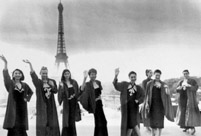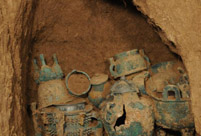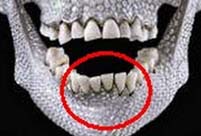 Fighters of Lanzhou MAC in confrontation training
Fighters of Lanzhou MAC in confrontation training
 3D printing to trigger third industrial revolution
3D printing to trigger third industrial revolution
 Top 10 brands that win rich women's hearts
Top 10 brands that win rich women's hearts
 Deng Xiaoping: 'I have a clear conscience all my life'
Deng Xiaoping: 'I have a clear conscience all my life'
 Xi Jinping: 'The people are our strength'
Xi Jinping: 'The people are our strength'
 Amazing cliff diving in cold winter
Amazing cliff diving in cold winter
 Enjoy Sochi 2014 in slow motion
Enjoy Sochi 2014 in slow motion
 University student sentenced to death for poisoning roommate
University student sentenced to death for poisoning roommate
 Chinese lunar New Year celebrated in San Francisco
Chinese lunar New Year celebrated in San Francisco
Rouhani also said Iran's religious beliefs and moral principles do not allow the Islamic republic's nuclear activities to be diverted to weapons-grade programs.
Even if there were no NPT or other treaties, these beliefs would never allow Iran to get closer to the production of WMDs, he added.
In addition, Iranian Foreign Minister Mohammad-Javad Zarif said Sunday that a comprehensive deal between Iran and the P5+1 group over the country's "peaceful" nuclear program is reachable.
However, such an outlook requires the other party to be committed to the Joint Plan of Action inked in Geneva earlier, which will make "a comprehensive solution possible within six months."
Lifting all sanctions against Iran will help Tehran and world powers reach a final agreement regarding the issue, Zarif said.
In the nuclear talks, "what is important is boosting the Iranians' confidence and respecting their rights" by the P5+1 group, Zarif said at joint press conference with visiting Spanish Foreign Minister Jose Manuel Garcia-Margallo.
His country will also "remove the logical concerns" of the P5+1 group over its nuclear program, he said.
"The measures implemented by Iran and further commitment it has undertaken, represent a positive forward, but much remains to be done to resolve all outstanding issues," the chief of the UN nuclear watchdog Yukiya Amano said on Monday.
Seven practical measures agreed by Iran and the IAEA, including managed visits to a uranium extraction mine and a yellowcake facility, have to be implemented by May 15, said Amano.
Iran's IAEA envoy Reza Najafi also called the cooperation between his country and the IAEA a positive development, believing it would be supported by all IAEA members.
To ensure Iran's nuclear program is exclusively peaceful, the IAEA and the P5+1 group are on the two diplomatic tracks with Iran, striving to resolve the issue through negotiations.
IAEA was still short of 1.6 million euros (around 2.2 million U. S. dollars) to implement a strengthened investigation of Iran's nuclear program, Amano said, adding that his agency needed the money to take the verification role related to the Joint Plan of Action, an interim deal signed between Iran and six major powers in Geneva last November.
Under the deal Iran agreed to freeze part of its nuclear activities in exchange for a relief in the West's sanctions on its economy.
On Feb. 20, after three days of intensive negotiations, the two sides announced a timetable for their talks toward a comprehensive deal and agreed for expert-level meetings to get into the issues in more details and define a framework for the negotiations.

 Old photos: Precious moments in Sino-French ties I
Old photos: Precious moments in Sino-French ties I Belgians warmly welcome arrival of China's giant pandas
Belgians warmly welcome arrival of China's giant pandas Photos: Top 10 pure beauties in showbiz
Photos: Top 10 pure beauties in showbiz Chinese Dream: the Chinese Spirit and the Chinese Way
Chinese Dream: the Chinese Spirit and the Chinese Way 51 bronze sacrificial utensils unearthed in Shaanxi
51 bronze sacrificial utensils unearthed in Shaanxi Most gorgeous female celebs in Chi-pao
Most gorgeous female celebs in Chi-pao Second round of test kicks off at Beijing Film Academy
Second round of test kicks off at Beijing Film Academy Ancient Qiang people had vertically grown teeth
Ancient Qiang people had vertically grown teeth Top 10 Chinese youth’s favorite seaside destinations
Top 10 Chinese youth’s favorite seaside destinations Sacrificial altar unearthed in China's Shannxi
Sacrificial altar unearthed in China's Shannxi Chinese warplanes C919 to appear at Singapore Airshow
Chinese warplanes C919 to appear at Singapore Airshow North China Sea Fleet conducts anti-submarine drill
North China Sea Fleet conducts anti-submarine drill Ruins of Shang Dynasty's structure unearthed in Shaanxi
Ruins of Shang Dynasty's structure unearthed in Shaanxi  Stunning figure skating in Sochi
Stunning figure skating in Sochi Intercity high speed train in operation
Intercity high speed train in operationDay|Week|Month